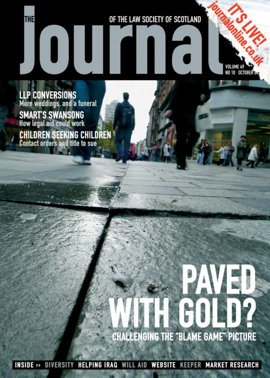What title?

Scottish courts have traditionally preferred to deal with questions of parental responsibilities and parental rights in a substantive rather than technical manner. The Court of Session eschewed the use of onus, for example, in favour of the real issue of the child’s welfare in White v White 2001 SC 689. Another technicality which ought, in my view, to be avoided is title to seek an order relating to parental responsibilities or parental rights. Before the coming into force of the Children (Scotland) Act 1995 questions of title arose fairly frequently in the context of whether grandparents, or ex-parents after adoption, could seek access to their grandchild or ex-child (see, for example F v F 1991 SLT 357; D v Grampian Regional Council 1995 SLT 519). Since the 1995 Act, this question continues to trouble the court, not so much on the point of principle but due to the structure of section 11 itself.
In White v White 1999 SLT (Sh Ct) 106, before that case reached the Inner House (which did not comment on the issue), Sheriff Principal Nicholson held that since section 11 allows the court to make orders “regulating” contact, a person who does not have the “parental right” of contact needs to seek an order under section 11(2)(b) granting parental rights before that person could seek an order under section 11(2)(d) regulating the rights acquired thereby; but Sheriff Principal Bowen disagreed with that approach in H v M 2000 SLT (Sh Ct) 88 and would have allowed the making of an order under section 11(2)(d) even when the person with whom contact was to be regulated did not have the “parental right” of contact. The implication of Sheriff Principal Bowen’s approach (which, it is submitted, is correct) is that the “contact” which can be regulated under section 11(2)(d) is not limited to the “parental right” of contact but might include contact between the child and a person who does not have any “parental right” (such as, for example, a grandparent).
“How” is different from “who”
The same question arose in a rather different context in D v H 2004 SLT (Sh Ct) 73 before, again, Sheriff Principal Bowen. The issue here was whether a 15-year-old boy could seek an order under section 11(2)(d) regulating contact between himself and his ex-sister, a girl who had been adopted away from the family some 10 years previously. The sheriff principal upheld the view of the sheriff that since what was being sought was “in the nature of an application seeking a parental rights order” and since “parental rights” can be conferred only on persons over the age of 16, the present action was incompetent. While it is true that section 11(2)(b)(i) prohibits the imposing of parental responsibilities on a person under the age of 16, it does not follow, as was assumed by both the sheriff and the sheriff principal, that it is incompetent to make a contact order regulating the arrangements for maintaining personal relations and direct contact between a child and a person under 16 with whom the child is not living.
The problem that the sheriff and the sheriff principal perceived in D v H was that an order described in section 11(2) (residence, contact, specific issue and the rest) is in fact made under, and constrained by, section 11(1): “In the relevant circumstances… an order may be made under this subsection in relation to (a) parental responsibilities, (b) parental rights, (c) guardianship, or (d)… the administration of a child’s property”. This means, Sheriff Principal Bowen held, that the court cannot make any of the section 11(2) orders unless it concerns one or more of the four concepts listed in section 11(1). He is clearly correct here. But where it is submitted he has gone wrong is in (i) confusing who has title to seek a section 11 order with who can possess and exercise what the statute describes as parental responsibilities and parental rights, and (ii) using the terminology of “parental rights order”, which is a concept that does not appear in the Act. A section 11 order must, the Act tells us, be “in relation to” such responsibilities or rights, but this does not mean that the order must involve the granting or withdrawing of such responsibilities or rights. The very existence of some of the section 11 orders makes this plain. A specific issue order under section 11(2)(e) is an order regulating a specific question which has arisen “in connection with parental responsibilities, parental rights, guardianship or the administration of a child’sproperty”. In other words a section 11 order can regulate how parental responsibilities are to be exercised as well as who is to have them. A grandparent, for example, may seek a specific issue order under section 11(2)(e) regulating “any specific question which has arisen… in connection with” the parent’s exercise of parental rights, such as for example whether the child is to receive religious instruction or attend a particular school or be provided with particular medical treatment, even when that grandparent is not seeking to be conferred with the “parental right” to determine the child’s religion, education or medical treatment. The rule that a section 11 order must “relate to” parental responsibilities and parental rights does not imply that an order can be granted only to those to whom parental responsibilities and parental rights can be granted (i.e. persons over the age of 16). Were this not so then artificial persons such as health boards or education authorities could not seek any order under section 11. But the terms of sections 11(5) and 15(4) indicate that artificial persons can apply for an order relating to parental rights, even although they cannot have parental rights conferred upon them.
Not just for grown-ups
If the above is correct, might it be that a contact order is different? The wording of section 11(2)(d) clearly implies that a contact order can regulate contact in fact as well as confer or withhold the legal right of contact (as Sheriff Principal Bowen held in H v M). But in the present case Sheriff Principal Bowen concluded that the use of the words “parental rights” means that only those eligible to hold “parental rights” have title to seek what he described as a “parental rights order”. This is not so. Section 2(4) defines “parental rights” as those listed in paragraphs (a) to (d) of section 2(1). Section 2 defines which rights parents have in order to fulfil their responsibilities, but paragraphs (a) to (d) list rights without limiting them to, or even mentioning, parents. In other words, “parental rights” is simply the phrase used as shorthand to describe a set of rights which parents have – but there is no implication that only parents can have these rights. One so-called “parental right” is the right to maintain personal relations and direct contact with the child on a regular basis. Parents have this right (section 2(1)(c)). Others might have this right, or seek it, or seek to have it vested in another, or seek to have another’s exercise of the right regulated by a section 11 order. The regulation of contact between a child and another person with whom he or she is not living will, whoever makes the application, always affect (and in that way relate to) how the parents’ parental responsibilities and parental rights will be exercised – at least to the extent that the parent loses complete discretion over who the child has contact with. So regulation of contact between a child and a third party relates to parental responsibilities and is therefore competent under section 11(1).Keep to the welfare question
It may have been that the sheriff and the sheriff principal were concerned that the present application was being used to subvert the adoption legislation. The 15-year-old applicant had spent some time away from home, and his ex-sister had been adopted away from the family. The applicant was now back with his mother and, 10 years after having last seen his sister, he sought an order seeking that contact which the 1995 Act explicitly prohibited his mother from seeking. There is no indication in the case that this influenced the sheriff’s or the sheriff principal’s decision or reasoning, but it is difficult to believe that the same result would have been reached had the 15-year-old brother been seeking contact with, say, a 14-year-old sister whom he had not seen since his parents divorced a year previously.
The same effective result could – and ought to – have been achieved by eschewing technicalities and exploring the substantive issue: was it in the welfare of the child to re-establish a connection with a family she had been adopted away from and had had no contact with for a decade? The court took a detour before it got to that question, but it ended up in a blind alley. It is submitted the decision is wrong.
Sheriff Crowe at Dundee in E v E, 12 August 2004, declined to follow Sheriff Principal Bowen on this matter. He was right to do so.
Kenneth McK Norrie, Professor of Law at the University of Strathclyde
In this issue
- Citizenship, society and solicitors
- The well unfair state
- Litigation nation
- Best medicine
- Take a deep breath
- What title?
- Walk this way?
- Know your strategy
- e-quilibrium?
- The researchers
- Rights out of anarchy
- Political correctness or positive change?
- Steering clear
- How far can a board go?
- Major role for new tribunal
- The race is on (again)
- Planning a superhighway
- Website reviews
- Book reviews
- Single survey's lonely heart
- In harmony
- Clearing the path






